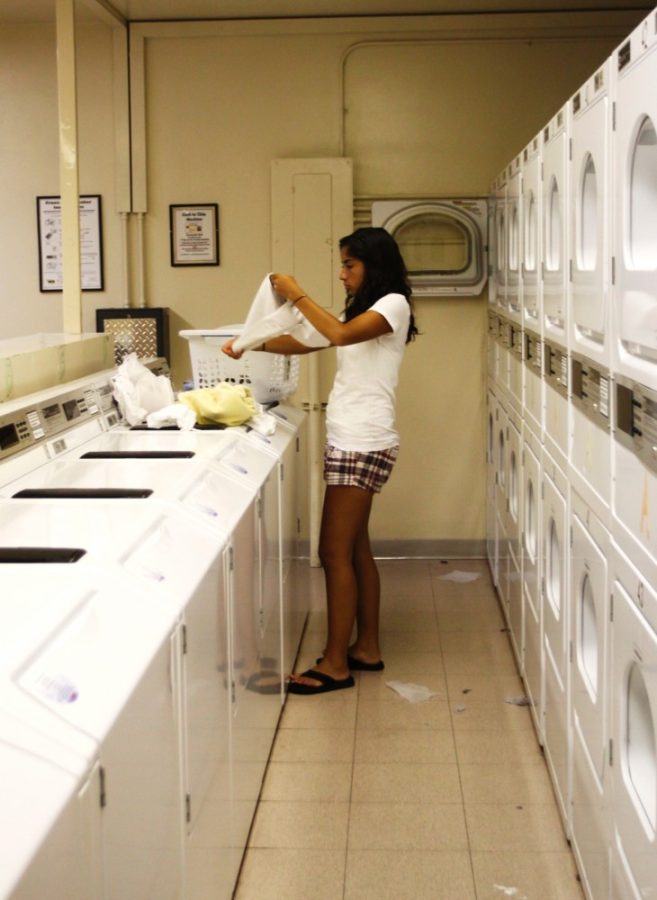Students living on campus have one less expense to worry about this year. Residence Life is no longer charging students to do laundry in their residence halls. Amanda Tester, a history junior who lives in Yuma Residence Hall this year and lived in Yavapai Residence Hall the last two years, is pleased about the change.
“”You save money you can spend on other things,”” she said. “”I still have to find time to do laundry — that’s the hard part.””
Tester gives tours on campus and said parents who expect their students to pay for laundry are pleasantly surprised.
“”It’s a new selling point for the dorms,”” she said.
Students paid $1 to use a washing machine last year and $0.75 to use a dryer, according to Jim Van Arsdel, assistant vice president for Residence Life and University Housing.
“”It’s kind of like the stars just aligned,”” said Van Arsdel, referring to how free laundry came about. In the past, students accessed washers and dryers through the SmartChip on their CatCard. Students can deposit money on this chip using one of 23 Cash-to-Chip machines on campus. The money on the chip is separate from a student’s meal plan, and can be used for printers, copiers and some vendors on campus, according to the CatCard Office’s Web site.
Arsdel said fewer organizations on campus are using the SmartChip and that, in the future, the CatCard Office may transition to a different system.
“”It’s better to be ahead of something like that than to have it happen and have no way to deal with.”” he said.
Residence Life considered investing in a new technology for students to pay for laundry, but realized that would be more expensive for everyone.
“”We need to be good partners with the rest of the university so we’re not a sole user of a technology that requires someone else to spend a lot of money supporting it,”” Van Arsdel said.
Mark Barton, bursar and CatCard director, said the UA started using the SmartChip about 10 years ago. Before that, students had to pay for their laundry using coins, and someone had to collect that change from the machines.
“”It was ineffective for students and for us,”” he said.
Barton said the SmartChip is not being eliminated, but they are looking at other options. The SmartChip is still accepted at the UofA Bookstore, U-Mart, coffee machines, libraries and Fast Copy.
So far, there is no new technology to replace the SmartChip.
Van Arsdel acknowledged that the cost of living in residence halls has increased over the past year, and said free laundry is one way of keeping prices affordable.
“”We try to find ways of making residence halls a valuable experience for students,”” he said. “”Not only something that is fun and exciting and educational, but something that’s also reasonably priced.””
To accommodate this change, Residence Life reallocated some of the money in the department so that they were using it more efficiently.
“”It isn’t so much that we’re going to have more expenses, it’s just that we’re not going to have the income we used to from that source,”” Van Arsdel said.
There are approximately 6,100 undergraduate students living on campus this year, compared to about 5,700 last year, Van Arsdel said.
Christina Carlson, a pre-nursing freshman and resident of Kaibab-Huachuca Residence Hall, also likes the free laundry.
“”You can do it when you want and not have to worry about keeping track of your money,”” she said. “”I’d probably end up going home to do it,”” Carlson said if she had to pay.
Tester and Carlson found the biggest problem with not having to pay for laundry is other students not removing their finished loads from the machines in a timely manner.
Van Arsdel said there are two possible outcomes that stem from providing free laundry.
“”On the good side, it costs students less,”” he said. “”On the bad side, it might be more difficult to get a washer and dryer because people are using it less efficiently than in the past.””
Van Arsdel believes students will save money and not superfluously do more laundry.
“”I don’t think (laundry) is a very fun task to do,”” he said. “”That’s not how I would spend my time.””
Each machine has a counter, and Residence Life will look at the numbers and get student feedback toward the end of the semester about how it is working. Residence Life will not take any action until the end of the year.
Van Arsdel already expects the numbers to increase since there are more students living on campus than last year.
“”We would look at the numbers and ask ourselves, ‘Is this a good thing or not?'”” he said.









